Oil and Gas Engineering Course in Rawalpindi Islamabad 0333-9014677
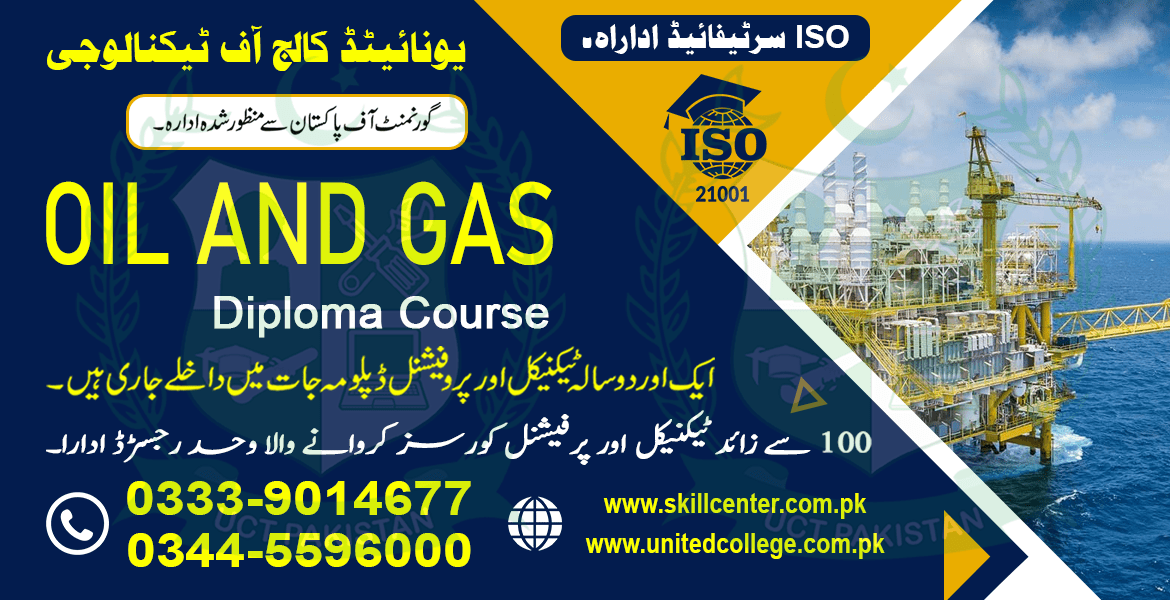

















Introduction
The skills and information required to work in the oil and gas business are taught in oil and gas diploma programs. These courses often cover subjects including oil and gas resource exploration, drilling, production, refining, transportation, and marketing. Many colleges in Pakistan offer diploma programs in oil and gas. Universities, technical institutes, and training facilities are some of these establishments. The National Institute of Petroleum and Geosciences, Pakistan Petroleum Limited Training Center, and the Institute of Petroleum Technology are a few of the most well-known organizations that provide these courses.
These courses can range anywhere from six months to two years, although their length might vary from school to university. For students who are unable to attend full-time classes, several schools now provide part-time and remote learning opportunities. Topics including oil and gas exploration, drilling operations, production processes, reservoir management, pipeline transportation, and safety precautions are frequently included in the curriculum of oil and gas diploma courses in Pakistan. Moreover, environmental laws and sustainable business methods in the oil and gas sector may be taught to students. Graduates of the pro program work in a variety of positions in the oil and gas sector, including those of drilling engineers, production engineers, project managers, and safety officers. They could also get the chance to work in allied fields like petrochemicals and renewable energy.
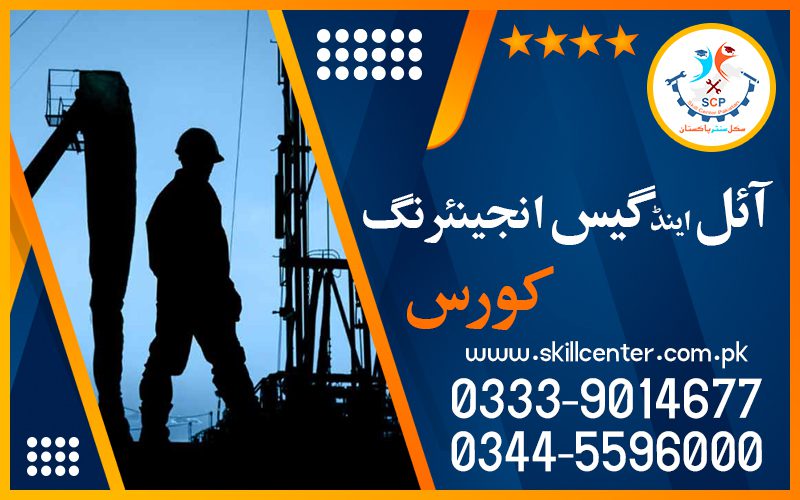

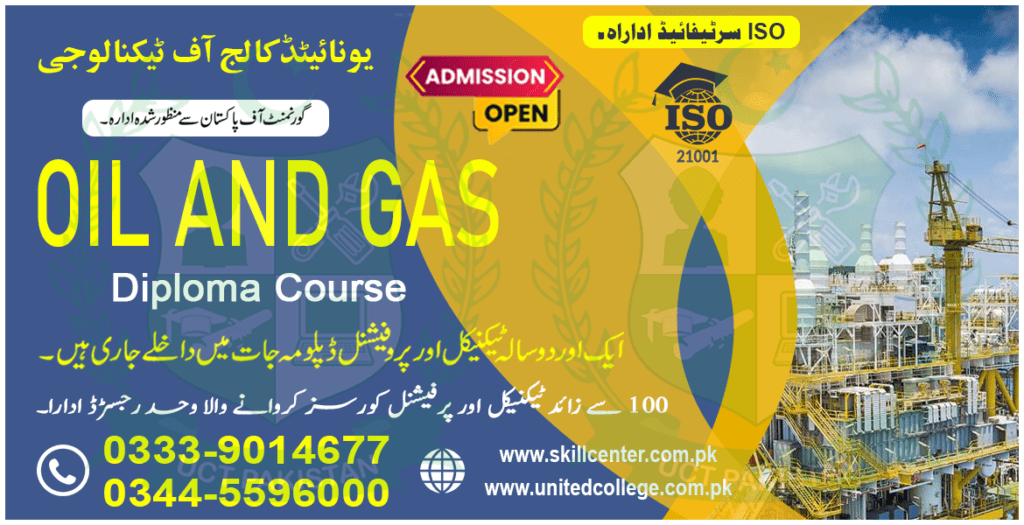





Oil and Gas Engineering Training Course Outline
The structure of an oil and gas diploma program might vary based on the school that offers it, but the subjects that are commonly included in such a program are outlined in the following basic overview.
- Overview of the oil and gas sector, its history, and the most recent developments are provided in the introduction.
- Geology and exploration are the study of the fundamentals of geology and geophysics, the techniques used in exploration, and the analysis of geological data.
- Basics of drilling equipment, drilling methods, well completion, and wellbore design are all part of the process of drilling and completion.
- Production Operations: Production management, equipment and facilities, artificial lift systems, and production operations.
- Reservoir engineering includes strategies for recovery, reservoir management, and reservoir characterization.
- Surface Facilities and Pipeline Transportation: Analysis of surface facilities, pipeline movement, and gas and oil measurement.
- Overview of the oil and gas industry’s health, safety, and environmental procedures, including information on regulatory compliance.
- Project Management: Planning, scheduling, and budgeting are all part of the project management principles.
- Introduction to petroleum economics and marketing, including information on price, supply and demand, and marketing tactics.
- Investigation of developing technology and future trends in the oil and gas sector, including the use of renewable energy sources and environmentally friendly procedures.
An oil and gas diploma course may also cover electives or specialties that allow students to concentrate on certain areas of interest, such as environmental sustainability, production management, or drilling engineering.





















































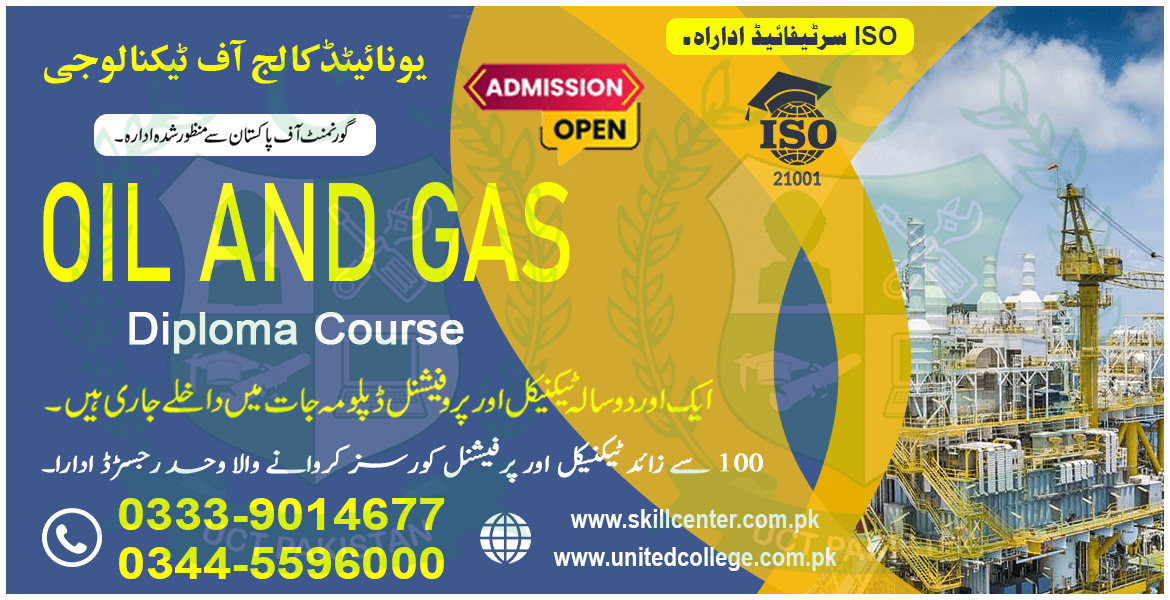









Duration and Fee Structure
Course Duration
Overall Program Length:
The Oil and Gas Engineering path at Skill Center Pakistan in Rawalpindi Islamabad is established to be completed over a complete period of approximately twelve months. This full-year software is meticulously designed to ensure that scholars not only draw close to the theoretical elements of oil and fuel engineering but also benefit from huge hands-on experience via laboratory periods, simulation sporting activities, and fieldwork initiatives. The prolonged period allows for a deeper exploration of critical topics and a sluggish, step-by-step progression through the curriculum, catering to beginners and people with a little prior exposure to the sector.
Phased Learning Approach:
The software is divided into multiple stages, starting with an extensive introductory module where foundational ideas and crucial safety protocols are introduced. As students develop, the course transitions into greater specialized modules, covering topics such as drilling technology, reservoir engineering, and manufacturing optimization. Each section is carefully timed to permit both theoretical understanding and sensible utility, ensuring that rookies can follow their understanding of real-world scenarios. The path shape additionally includes periodic checks and mission work, imparting chronic feedback, and reinforcing learning results at some point during the 12 months.
Fee Structure
Comprehensive Cost Breakdown:
The charge shape for the Oil and Gas Engineering path is designed with transparency and affordability in mind. The average charge encompasses several components, such as training, entry to advanced laboratory and simulation facilities, direction substances, and additional charges for field schooling periods. This targeted breakdown helps prospective students understand precisely what they’re investing in, with clean delineations for each element of the direction charge. The fee structure is aggressive inside the enterprise, aiming to provide extraordinary schooling without imposing undue financial burden.
Flexible Payment Options:
Recognizing the various economic circumstances of numerous student bodies, Skill Center Pakistan offers flexible payment plans that allow students to manage their educational costs more easily with no trouble. Options, inclusive of installment plans or deferred fee schedules ,are to be had, making sure that the path is accessible to full-time college students and working professionals. These price options are designed to ease the prematurely monetary load, making it possible for aspiring engineers to pursue advanced training without compromising their monetary balance. The dedication to flexibility within the charge structure displays the center’s broader challenge of democratizing admission to quality engineering training.
Value for Investment:
Overall, the charge structure represents the amazing cost for money through combining rigorous instructional schooling with practical enterprise publicity. By investing in this path, students are not handiest gaining technical information but are also getting ready themselves for a dynamic career within the oil and gas industry, wherein practical skills and enterprise readiness are distinctly valued. The transparent rate breakdown and bendy payment arrangements underscore the middle’s commitment to making sure that high-caliber training is both low-cost and available to all influenced applicants.
Course Duration: 6 MONTHS
Total Fee: 65,000/-





















































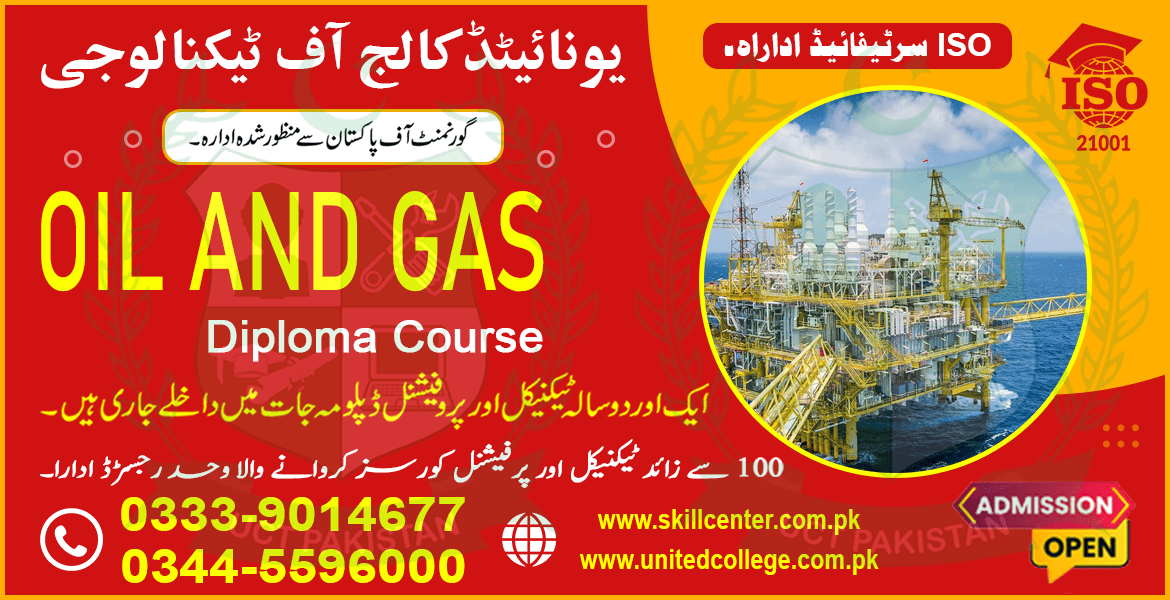





















































Oil and Gas Industry Trends: Shaping the Future of Energy
The oil and fuel agency is experiencing a duration of speedy evolution, pushed via technological enhancements, environmental pressures, and converting international energy needs. Below are the crucial difficulty traits shaping the organization in recent times:
1. Digitalization and Automation
The adoption of modern-day-day technologies like Artificial Intelligence (AI), Internet of Things (IoT), and huge records analytics is revolutionizing the arena. These tools beautify overall performance in exploration, drilling, and production methods, whilst predictive safety and real-time monitoring reduce downtime and operational fees. Digital twins and superior simulations also are turning into crucial for optimizing resource manage.
2. Energy Transition and Sustainability
As the place moves in the route of a low-carbon destiny, the oil and gas employer is embracing cleaner power solutions. Companies are making an investment in carbon seize, utilization, and garage (CCUS), blue and green hydrogen manufacturing, and renewable electricity obligations. This shift is driven by using the use of the use of stricter environmental rules and the worldwide push to advantage internet-zero emissions by using manner of 2050.
3. Decentralized Energy Systems
The upward thrust of decentralized strength systems, which includes microgrids and allocated generation, is tough conventional centralized energy fashions. This style is specifically apparent in faraway regions and growing regions, wherein localized strength answers are extra cost-powerful and dependable.
4. Liquefied Natural Gas (LNG) Growth
The call for LNG is surging as a purifier possibility for coal and oil. LNG is becoming a cornerstone of worldwide power trade, with growing exports from the U.S., Qatar, and Australia. This fashion is supported by means of manner of its versatility and decreased carbon footprint as compared to wonderful fossil fuels.
5. Geopolitical and Market Volatility
Geopolitical tensions deliver chain disruptions, and fluctuating oil costs hold to impact the agency. Companies that specialize in resilience and adaptability, diversifying their portfolios, and exploring new markets to mitigate dangers.
6. Workforce Transformation
The enterprise is witnessing a shift in the body of workers’s requirements, with a growing want for abilities in digital technologies, renewable electricity, and sustainability practices. Upskilling and reskilling duties have come to be essential to meet the needs of a rapidly converting strength landscape.
7. Focus on Methane Emission Reduction
Methane, an effective greenhouse gasoline, is a number one interest for the company. Companies are deploying superior monitoring generation and adopting great practices to lessen methane leaks and beautify environmental universal performance.
8. Renewable Energy Integration
Oil and fuel agencies are increasingly making funding in wind, sun, and biofuels to diversify their strength portfolios. This integration isn’t always first-class pushed with the aid of environmental desires however additionally thru the need to stay aggressive in a transitioning electricity marketplace.
These tendencies spotlight the oil and gas agency’s determination to innovation, sustainability, and versatility as it navigates the stressful conditions and possibilities of the 21st century.














































































































Why Choose Skill Center Pakistan?
Skill Center Pakistan is a leading call-in expert in education, supplying awesome education packages tailor-made to meet the needs of the oil and fuel industry. Here’s why you should pick Skill Center Pakistan for your Oil and Gas Engineering Course in Rawalpindi Islamabad:
1. Experienced and Industry-Expert Instructors
The middle boasts a crew of quite certified teachers with great enjoy inside the oil and gasoline area. Their actual-global insights and sensible know-how ensure that scholars advantage a deep expertise of enterprise practices and challenges.
2. Comprehensive and Up-to-Date Curriculum
The course curriculum is designed to align with worldwide requirements, covering important topics together with drilling operations, reservoir engineering, petroleum geology, and safety protocols. This guarantees that graduates are well-organized to excel in each nearby and worldwide market.
3. Hands-On Practical Training
Skill Center Pakistan emphasizes realistic learning, presenting college students with get right of entry to enterprise-popular gear, systems, and software. This hands-on method helps bridge the space between ideas and real-world applications, making students process-oriented from day one.
4. State-of-the-Art Facilities
The center is equipped with modern facilities and assets, developing optimum learning surroundings for students. From properly ready labs to superior training substances, Skill Center Pakistan guarantees a seamless academic experience.
5. Flexible Class Schedules
Understanding the needs of diverse newbies, Skill Center Pakistan offers flexible magnificence timings, which include weekend and evening sessions. This makes it easier for running experts and students to balance their training with other commitments.
6. Affordable Fees and Value for Money
Skill Center Pakistan provides brilliant schooling at competitive and less expensive rates, ensuring that the best education is offered to everyone. The return on investment is tremendous, given the career opportunities this course opens up.
7. Strong Industry Connections and Career Support
The middle has installed strong ties with main corporations in the oil and gasoline industry, imparting college students superb networking possibilities and professional placement help. This aid helps graduates steadily reward positions inside the industry.
8. Proven Track Record of Success
Skill Center Pakistan has a history of manufacturing professional specialists who’ve gone directly to gain achievement in the oil and gas industry. Their alumni network is a testament to the excellent training and training provided.
By selecting Skill Center Pakistan, you are investing in a future packed with possibilities, boom, and achievement inside the thriving oil and gasoline zone. Join today and take the first step in the direction of a profitable profession!

















































































































Practical Training and Workshops
The Oil and Gas Engineering Course in Rawalpindi Islamabad provided with the aid of Skill Center Pakistan locations a robust emphasis on practical schooling and workshops to ensure college students advantage actual-global capabilities and arms-on experience. This aspect is designed to bridge the distance between theoretical understanding and industry utility, preparing college students for the demanding situations of the oil and fuel industry.
Hands-On Training
Students work with enterprise-preferred equipment and software to simulate real-world eventualities, together with drilling operations, reservoir management, pipeline layout, and protection protocols. This sensible publicity allows novices to apply theoretical ideas in a controlled, professional surroundings, building self assurance and technical understanding.
Interactive Workshops
The course includes ordinary workshops performed by enterprise specialists, focusing on today’s technologies, trends, and best practices within the oil and gas industry. These sessions offer treasured insights into real-world demanding situations, revolutionary answers, and professional possibilities. Workshops also emphasize teamwork, trouble-solving, and effective conversation, which might be crucial talents for achievement in this field.
Benefits of Practical Learning
By combining hands-on training with interactive workshops, students broaden a deep know-how of the oil and gas enterprise’s operational and technical components. This sensible method guarantees that graduates are not most effectively informed but also task-ready, geared up with the talents and experience demanded using employers inside the power sector.
Skill Center Pakistan’s consciousness of practical education and workshops makes this route a standout preference for anyone intending to construct a successful profession in oil and fuel engineering.



























































Certification and Accreditation
Globally Recognized Certification
Skill Center Pakistan’s Oil and Gas Engineering Course culminates in the awarding of a globally recognized certification to college students who successfully whole this system. This certification is a mark of excellence, validating the competencies, knowledge, and practical know-how gained at some stage in the course. It serves as an effective device for graduates, permitting them to show off their qualifications to capacity employers and stand out in the aggressive oil and gas industry.
Accreditation by using Reputable Bodies
The course is authorized by the main industry agencies and academic establishments, ensuring that the curriculum adheres to the very best standards of first-rate and relevance. This accreditation is a testament to this system’s alignment with worldwide fine practices and its capacity to satisfy the evolving demands of the oil and gas sector. By partnering with identified accrediting bodies, Skill Center Pakistan ensures that its certification holds extensive cost and is widely frequent by way of employers globally.
Benefits of Certification and Accreditation
- Enhanced Employability: Employers in the oil and fuel industry prioritize applicants with approved certifications, because it assures them of the candidate’s competence and readiness for the job. Graduates of this course are nicely-located to stable roles in drilling, reservoir management, pipeline layout, and more.
- Industry-Relevant Skills: The certification demonstrates skillability in key regions together with petroleum geology, drilling operations, protection protocols, and environmental management. These abilities are vital for fulfillment within the oil and fuel zone.
- Career Advancement Opportunities: With an authorized certification, graduates can pursue better-level positions and tackle greater challenging roles inside the industry. It additionally opens doors to international job possibilities, because the certification is recognized globally.
- Professional Credibility: Holding a permitted certification complements a professional’s credibility and popularity, making them a preferred choice for employers and industry stakeholders.
Why Choose Skill Center Pakistan?
Skill Center Pakistan is dedicated to providing remarkable, authorized education that meets the desires of each student and the enterprise. The Oil and Gas Engineering Course in Rawalpindi Islamabad, is designed to equip students with the technical knowledge, practical abilities, and professional certifications required to excel in this area. By enrolling in this application, college students benefit get entry toexperiencedd teachers, present-day education centers, and a curriculum that is frequently up to date to mirror industry traits.
Enroll Today for a Bright Future
Earning an approved certification in oil and gasoline engineering from Skill Center Pakistan is a strategic step closer to constructing a successful career in this beneficial enterprise. Whether you’re a newbie seeking to enter the field or an expert searching to upskill, this path presents the tools and qualifications needed to attain your goals. Don’t leave out this opportunity to benefit from a competitive edge—join nowadays and take the first step toward a worthwhile career in oil and gas engineering!































































































Career Opportunities After Completion
Completing the Oil and Gas Engineering Course in Rawalpindi Islamabad at Skill Center Pakistan unlocks a global of numerous and profitable career possibilities within the energy sector. Here’s an in-depth have a take look at the potential professional paths you can pursue:
1. Petroleum Engineer
As a petrol engineer, you’ll be concerned in designing and growing techniques for extracting oil and gas from underground reservoirs. This role is essential in maximizing useful resource recuperation and making sure green production strategies.
2. Drilling Engineer
Drilling engineers specialize in making plans and overseeing drilling operations. They make sure that drilling sports activities are done properly, successfully, and in compliance with environmental rules.
3. Reservoir Engineer
Reservoir engineers’ recognition of studying reservoir information to optimize oil and fuel extraction. They use superior strategies to estimate reserves, are looking ahead to production expenses, and expand techniques for more appropriate restoration.
4. Pipeline Engineer
Pipeline engineers design, construct, and operate pipelines that ship oil and gas from manufacturing sites to refineries and distribution facilities. This position guarantees the secure and efficient transportation of property.
5. Health, Safety, and Environment (HSE) Officer
HSE officials play an essential role in ensuring workplace safety and environmental compliance. They amplify and position into effect protection protocols to limit risks and protect workers and the surroundings.
6. Oilfield Services Specialist
Graduates can work with oilfield carrier organizations, supplying technical resources and solutions for drilling, nicely of entirety, and production operations.
7. Refining and Production Roles
Opportunities exist in refineries and manufacturing facilities, wherein experts oversee the processing of crude oil into usable products and control daily operations.
8. Exploration Geologist
For those interested in the geological element, this role involves identifying the ability of oil and gas reserves via reading geological records and conducting regional surveys.
9. International Opportunities
The oil and gasoline business enterprise is worldwide, providing opportunities to work with multinational organizations and on global initiatives in regions such as the Middle East, Africa, and North America.
10. Career Growth and High Earning Potential
The oil and gas region is noted for its competitive salaries and terrific career boom prospects. With Enjoy, specialists can boom to senior roles which encompass assignment managers, experts, or technical advisors.
By completing this path, you’ll benefit from the talents and certifications needed to excel in these roles, making you a valuable asset to employers in the electricity industry. Start your adventure today with Skill Center Pakistan and secure a promising destiny in oil and gasoline engineering!





































































































Comparison with Other Institutes
When choosing the right institute for an Oil and Gas Engineering Course in Rawalpindi and Islamabad, Skill Center Pakistan distinguishes itself in several key areas in comparison to other establishments. Here’s a detailed comparison:
1. Curriculum and Practical Training
While many institutes generally focus on theoretical know-how, Skill Center Pakistan balances principles with extensive hands-on training. The path includes realistic sessions on drilling simulations, pipeline layout, and safety protocols, ensuring college students benefit from real-world competencies. Other institutes often lack such comprehensive, sensible publicity, leaving graduates less prepared for industry demands.
2. Experienced Instructors
Skill Center Pakistan employs industry specialists with years of field experience to educate the route. This ensures students learn from professionals who apprehend the today’s trends and demanding situations in the oil and fuel region. In comparison, a few institutes rely upon much less skilled faculty, that could restriction the intensity and relevance of the schooling provided.
3. Affordability
Skill Center Pakistan offers its Oil and Gas Engineering Course at an aggressive fee, making it more affordable to a broader target market. Many other institutes rate significantly higher expenses for comparable applications, often without supplying extra costs in terms of sources or training.
4. Flexible Learning Options
Understanding the needs of working experts and students, Skill Center presents flexible class schedules, which include weekend and nighttime batches. This flexibility is hardly ever offered using different institutes, which frequently keep to inflexible timings, making it difficult for many to pursue the route.
5. Industry Connections and Job Placement
Skill Center Pakistan has strong ties with the main companies in the oil and gas enterprise, offering college students treasured networking opportunities and job placement help. Many different institutes lack such connections, leaving graduates to navigate the process marketplace on their own.
6. Modern Facilities
The institute is ready with trendy centers, along with superior labs and simulation equipment, to beautify the getting-to-know-you experience. In comparison, a few institutes perform with outdated equipment and restricted assets, hindering college students’ potential to take advantage of practical abilities.
7. Student-Centered Approach
Skill Center Pakistan prioritizes student achievement, supplying customized guidance and help along the way. This scholar-focused technique is often missing in large institutes, in which personal interest may be constrained because of high enrollment numbers.
In summary, Skill Center Pakistan’s Oil and Gas Engineering Course in Rawalpindi Islamabad, offers an advanced combo of affordability, sensible education, skilled school, and profession aid, making it the best desire for aspiring oil and gasoline specialists in Rawalpindi and Islamabad.












































































































Admission Process and Eligibility
Eligibility Criteria
To enroll in the Oil and Gas Engineering Course in Rawalpindi Islamabad supplied by Skill Center Pakistan, candidates should meet the following requirements:
- A minimal qualification of Intermediate (12 years of schooling) in technological know-how or engineering-related fields is needed.
- Individuals with relevant experience in the oil and gas industry are also eligible to use.
- A sturdy hobby in pursuing a career in the oil and gas industry is encouraged.
Admission Process
The admission process at Skill Center Pakistan is designed to be simple and hhassle-free Here’s how you can follow:
1. Document Submission: Visit the Skill Center Pakistan workplace in Rawalpindi or Islamabad and pusubmithe desired files, together with:
- Copies of your educational certificates (Matric, Intermediate, or higher).
- A reproduction of your CNIC (National Identity Card).
- Two recent passport-sized images.
2. Registration Form: Complete the registration form provided by way of the institute.
3. Fee Payment: Ay, the path price to confirm your admission. Skill Center Pakistan offers flexible fee options to deal with college students.
4. Confirmation: Once your files are demonstrated and the price is processed, you may get a hold of confirmation of your enrollment within the process.
No front examination is needed, making the method available to all eligible applicants. Start your adventure toward a a hit profession in the oil and gas industry via enrolling these days!







































































Frequently Asked Questions (FAQs) about the Oil and Gas Engineering Course
1. What is the period of the Oil and Gas Engineering Course?
The period of the path typically stages from three to 6 months, relying at the software form and the extent of specialization. Skill Center Pakistan offers bendy schedules to residence each entire-time and element-time university students.
2. What subjects are covered within the direction?
The path covers a large variety of topics, which includes drilling operations, reservoir engineering, petroleum geology, pipeline format, protection manipulate, and environmental recommendations. It additionally consists of realistic schooling on company-modern day equipment and software program software.
3. Who can be a part of this direction?
This path is suitable for novices, sparkling graduates, and specialists looking for to beautify their skills in the oil and fuel area. No earlier enjoy is required, due to the truth the software program is designed to cater to all ranges of expertise.
4. What are the career possibilities after completing this course?
Graduates can pursue careers as drilling engineers, reservoir engineers, petroleum engineers, pipeline engineers, protection officers, and greater. The oil and gas business enterprise offers opportunities in every country wide and worldwide markets.
5. Does Skill Center Pakistan provide certification?
Yes, upon successful of entirety of the course, university students gather a diagnosed certification from Skill Center Pakistan, this is valued through employers within the oil and fuel enterprise.
6. Are there any stipulations for enrolling inside the path?
There are not any strict situations, however a essential expertise of technological understanding and mathematics may be beneficial. The path is designed to be handy to humans from numerous instructional backgrounds.
7. Does the direction embody realistic education?
Yes, the route emphasizes hands-on education, along with the use of corporation-stylish equipment, software programs software, and tools. This guarantees that students gain access to sensible revenue alongside theoretical data.
8. What is the price form for the direction?
The price form varies depending on the route duration and diploma of specialization. For specific data, touch Skill Center Pakistan immediately.
9. Are there machine placement possibilities after completing the route?
Skill Center Pakistan gives career counseling and mission placement help to help graduates find employment within the oil and gasoline companies.
10. How can I sign on inside the route?
You can join by using the use of touring Skill Center Pakistan’s campus in Rawalpindi or Islamabad, or with the useful resource of contacting them through their internet site or smartphone range for online registration and similar facts.
For extra records, experience free to gain out to Skill Center Pakistan and take the first step towards a fulfillment profession in oil and fuel engineering!





























































































































































































































